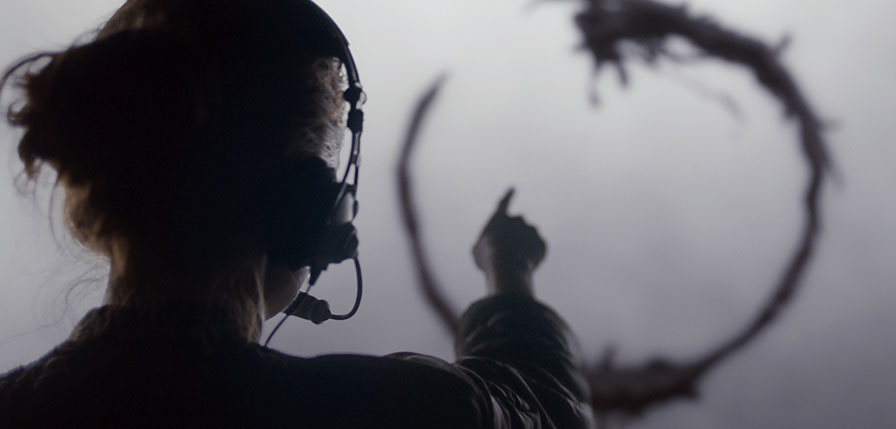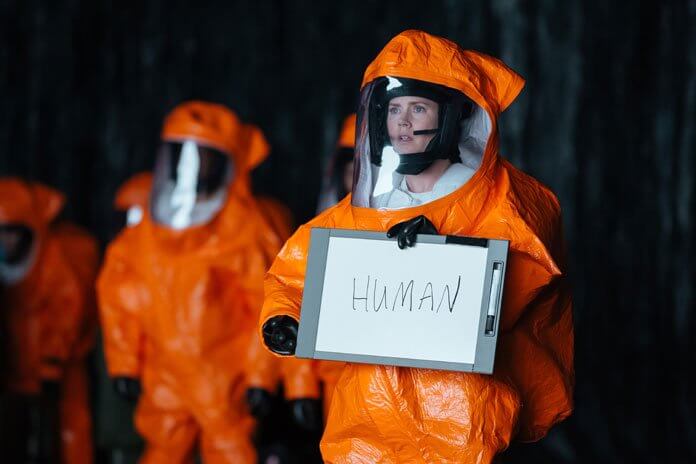It was less than two hours after watching the movie Arrival yesterday that I realized it had solved, for me, one form of the problem of evil.
I can’t discuss this without spoilers, but even if you have yet to see the movie, it may be worth reading on, although I suspect that just as the underlying theological problem cannot be appropriately considered in a dispassionate manner, the emotional impact of this aspect of the film may also be crucial.
 Linguistics is a major focus of the film. Some academics commented that, for all the realism in the struggle to communicate, to decipher, to interpret, the filmmakers botched that by depicting a professor of linguistics having an expensive house beside a lake. But other aspects made up for that – students not showing up for class when news of the arrival of aliens was breaking. Then the cell phones of the few students who were in class going off. Then the professor showing up diligently the following day and finding that not one student showed up.
Linguistics is a major focus of the film. Some academics commented that, for all the realism in the struggle to communicate, to decipher, to interpret, the filmmakers botched that by depicting a professor of linguistics having an expensive house beside a lake. But other aspects made up for that – students not showing up for class when news of the arrival of aliens was breaking. Then the cell phones of the few students who were in class going off. Then the professor showing up diligently the following day and finding that not one student showed up.
About midway through the movie, mention is made of the view that immersion in a new language rewires your brain. Towards the end of the movie, we learn that this had been happening to the main character, Dr. Louise Banks, and that what we thought were memories of events in her past were in fact memories of her future. As she learned the language of the heptapods, who don’t experience time in the same way that we do, she begins to also “premember” her future.
And that includes the details with which the movie begins. The life of her daughter Hannah, who dies tragically young of a rare disease.
And so by the end of the movie, the question that is posed is whether we would choose to follow a path when we know the outcome.
And despite the tragedy and the heartache that it brings, Dr. Banks nonetheless chooses to follow the path that she has foreseen – presumably because she appreciates that along with the tragedy, there will be a life of incredible beauty, even if that life is cut short.
I wrote a song a couple of years ago, after reflecting on the death of a relative, that it is better to have lived half a life than not have lived at all.
And that topic is at the heart of some of the most recent episodes of the TV show Timeless. Agent Denise Christopher articulated how, with a time machine in the hands of people determined to change history, the big risk is no longer simply that something will happen to the people you love. Now the fear is that they might never have existed, and you would have no recollection of them.
And so that brings us to theodicy, to the problem of evil. It can be explored in relation to both Arrival and Timeless each on their own, but becomes even clearer at the intersection.
If someone changes history so that a person that would have existed now no longer does, is that akin to murder? Does God, or a time traveler, have any obligation to give existence to potential people? Does the fact that they were once actualized in a timeline change the obligation?
 If you are wondering how this relates to the problem of evil, the question is often asked whether it was worth creating the universe, given the Holocaust and other atrocities. Could anything ever make it worth having brought into existence a universe that has such horrors?
If you are wondering how this relates to the problem of evil, the question is often asked whether it was worth creating the universe, given the Holocaust and other atrocities. Could anything ever make it worth having brought into existence a universe that has such horrors?
But we must ask the reverse question as well. Is it worth not bringing any universes into existence in order to ensure that no attempted genocide ever occurs? To put it more personally, would you consider it a better choice for you and everyone you love to never have existed, if that would prevent the atrocities in Iraq, and Rwanda, and the former Yugoslavia, and the list could go on and on?
We cannot discuss this topic from the perspective of God – indeed, as humans, we cannot hope to know whether God has anything like the kind of deliberative choice-making that humans have, or is very different. But working with the analogy to human choice, the question is whether there is any moral obligation to bring beautiful people and things into existence once the potential is there for them to exist.
And so there is a problem of beauty (and of love and of significance) that is parallel to the problem of evil, and of undeserved suffering, and of all the rest that horrifies us. If we can ask about whether the cost in evil is worth the good in the world, we must also ask the value of the good in the world, and whether choosing to have it never be is not a worse atrocity than all the Holocaust. Would choosing to bring it about that no human being, no living thing, ever existed be a justifiable means to preventing the Holocaust and other events like it, or something worse still?
Or to bring it back to Arrival, would you choose to spare yourself and your child the tragedy of illness and untimely death, if the cost of doing so was making them not ever have existed?
To echo the words of the movie, we need to ask the big question whether we are ready or not, and in doing so, we must ask whether we can embrace – and whether God could embrace – the journey of life, of existence, in all its individual aspects, knowing where it leads.
I’m not sure that the questions above have a clear answer that everyone will agree on. But the questions are worth asking nonetheless, and doing so gives one a different perspective on the problem of evil. Do you agree?
I would be remiss if I didn’t mention that, in addition to the philosophical/ethical/theological element that is raised by the central premise, the movie also includes some more standard elements related to the subject of a recent article from the BBC, namely the theological implications of alien life. In Arrival we get two glimpses on television of the religious reactions to the arrival of the aliens. In one brief snippet, a large number of Muslims are seen praying. In another longer news clip, we learn that the St. Lawrence Pentecostal group had committed suicide, burning their building to the ground with themselves inside, because they believed that the arrival of these twelve (!) ships was something that had been prophesied. We also see how soldiers are influenced by right wing talk show hosts to undertake hostile action towards the aliens. But those elements seem to me far more stereotypical and thus less interesting, and less insightful, than the more central questions about time, choice, tragedy, value, and purpose.
And of course, the language in which we ask those questions may determine what precisely they mean, and what answers it is possible to give.
The movie Arrival is based on Ted Chiang’s “Story of Your Life.”














